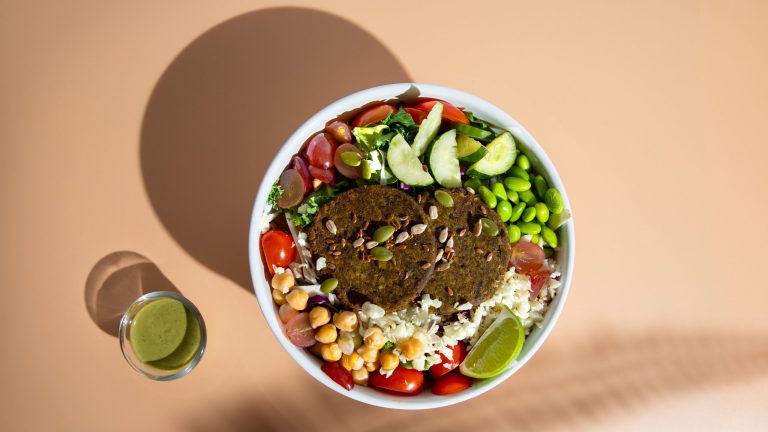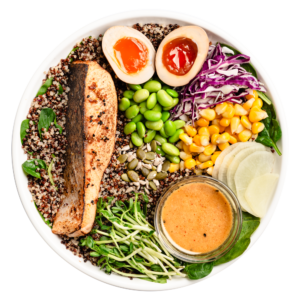Welcome to our informative series on plant-based diets (PBD). We use a lot of plant-based ingredients at SaladStop! and understand that many people are adopting a plant-based eating style for health benefits, environmental issues, and / or animal welfare.
A PBD is any type of dietary pattern predominantly based on unprocessed plant foods such as legumes, nuts and seeds, vegetables, fruits, whole grains, and herbs and spices that minimizes animal foods such as seafood, chicken, beef, pork, dairy, and eggs. Therefore, anyone (even omnivores!) can eat a PBD. Below are definitions of common PBD:
- Vegan: Excludes all animal products such as meat, poultry, seafood, dairy, eggs, and usually honey
- Lacto-vegetarian: Excludes meat, poultry, seafood, and eggs but allows all dairy based products
- Lacto-ovo-vegetarian: Same as lacto-vegetarian but allows eggs
- Pescatarian: Excludes meat, poultry, dairy, and eggs, but allows seafood. Some pescatarians allow eggs or dairy or both (lacto, ovo, or lacto-ovo).
- Flexitarian: Semi-vegetarian diet that is mostly plant-based but allows small amounts of meat, dairy, eggs, poultry, and fish.
The Nutrient Profile of a PBD

- Naturally high in vitamins C, A, E, K, pyridoxine (B6), thiamine (B1), and minerals potassium, folate, magnesium, potassium, and manganese;
- High in fiber for good digestion and gut health;
- High in phytochemicals that are important antioxidant compounds;
- A variety of plant proteins provide all the essential amino acids and beans are the most satiating protein; due to their dual protein and fiber content;
- Plants do not contain cholesterol; and
- Low in saturated fat and high in healthy fats such as monounsaturated and polyunsaturated.
The Potential Benefits of a PBD

Disease prevention: Vegans and vegetarians have a reduced risk of ischemic heart disease, type 2 diabetes, hypertension, certain types of cancer, and obesity. A literature review of the Adventist cohort studies found that vegetarian diets may protect against cardiovascular diseases, cardiometabolic risk factors, some cancers and total mortality. Compared to lacto-ovo-vegetarian diets, vegan diets seem to offer additional protection for obesity, hypertension, type-2 diabetes, and cardiovascular mortality. This could be because fruit and vegetable consumption are inversely associated with some chronic diseases and all-cause mortality.
Regular bowel movements: Vegans tend to consume approx. 41 grams of fiber and vegetarians appox. 34 grams of fiber while the average US adult consumes15 grams a day. Hopefully the average Singaporean does better! Fiber can also help lower cholesterol, manage weight, and control blood sugar.
Improved gut health: Gut health is an important part of good immune function, vitamin and mineral absorption, and may play a role in disease development. The food we eat can determine if good or bad bacteria develop. A recent study found that a healthy microbiome is linked to a diet rich in high-fiber vegetables like spinach and broccoli, nuts, fish, and eggs, as well as polyunsaturated fats from walnuts, pumpkin, flax, and chia seeds. The study also found that the development of bacteria associated with chronic disease was supported by dairy desserts, unhealthy meats, and processed foods.
More energy: There are numerous ways that food can increase or destroy energy levels and one way is by insulin regulation. Fiber rich foods combined with healthy proteins and fat will improve blood sugar control for a better mood and energy levels that don’t fluctuate. A tip is to include vinegar with a meal and don’t go overboard on coffee.
Anti-aging: The exact reason for aging is unknown but part of the reason may be due to oxidative damage caused by reactive oxygen species (ROS). The phytochemicals in plant foods scavenge for ROS that cause oxidative stress and inflammation.
Weight management: Those who follow a plant-based diet typically have a lower body weight than omnivores, especially those following a plant-based vegan diet.
Making Healthy Choices

Vegan, vegetarian, and flexitarian diets are not automatically healthy since sugar / desserts, salt, processed foods, and unhealthy cooking methods can all be animal product free. A diet with no or reduced animal products must be plant-based and include a variety of nutrient dense foods to obtain the potential health benefits and nutrient profile, but of course you can still have a bit of fun. An unhealthy and poorly planned vegan or vegetarian diet that lacks variety is at risk for nutrient deficiencies.
Supplementation with vitamin B-12 is essential for vegans and some vegetarians but all other nutrients can all be obtained via foods. A PBD is not hard to follow since plant foods are plentiful and diverse and we are lucky to have a good variety of dining and grocery store options in Singapore. Follow our Instagram account for exciting vegan recipe updates and check out our vegan grocer website Good Food People!




